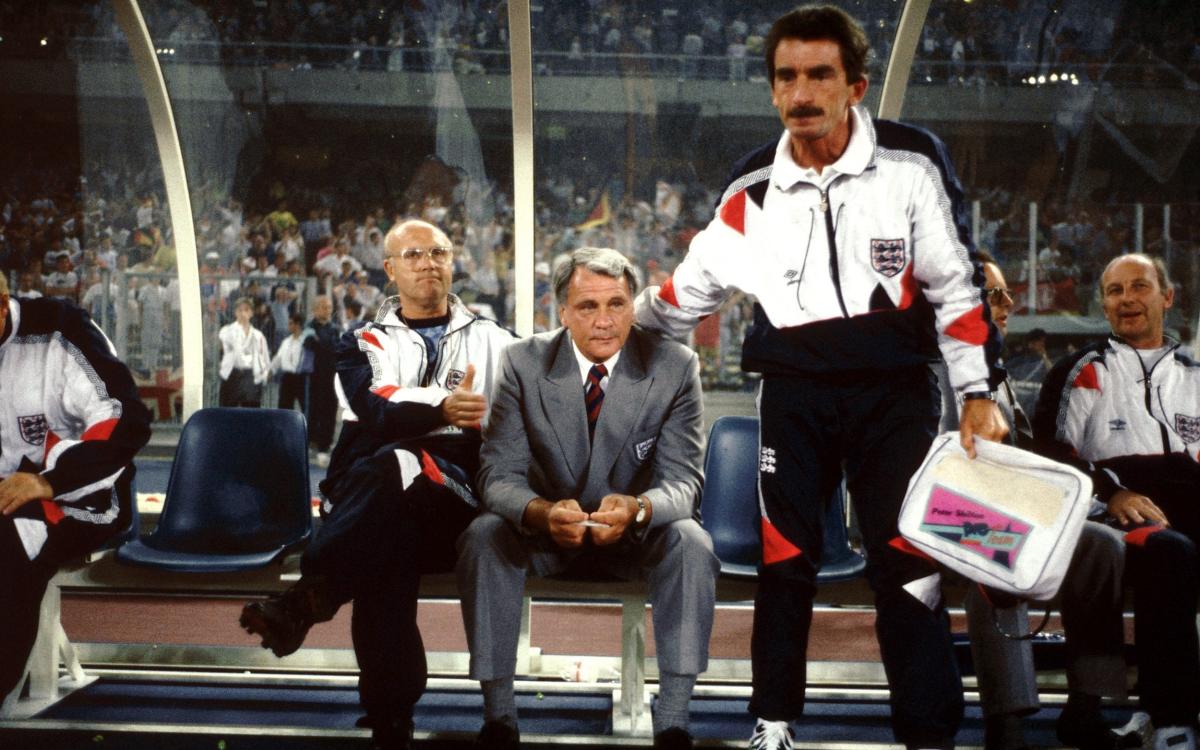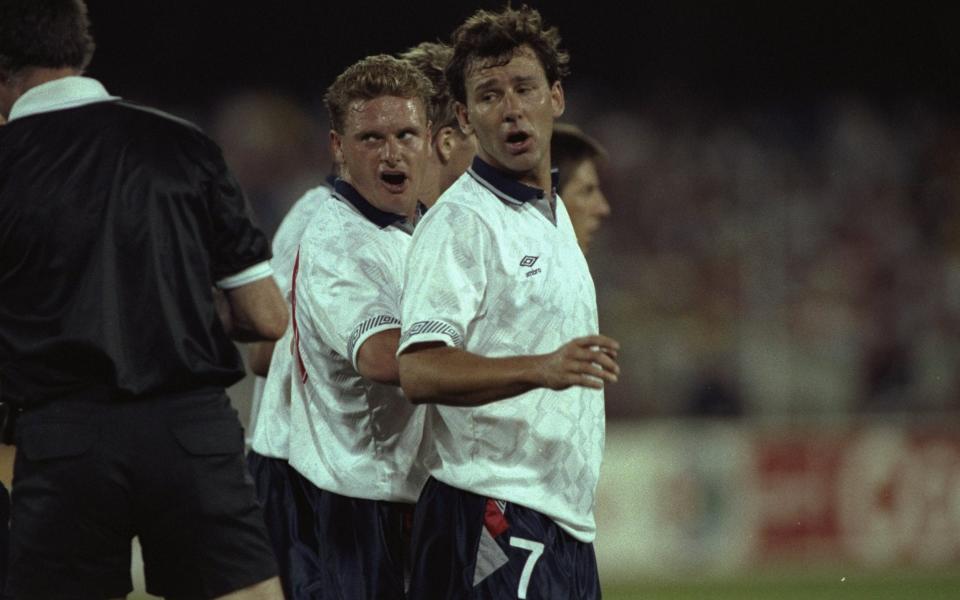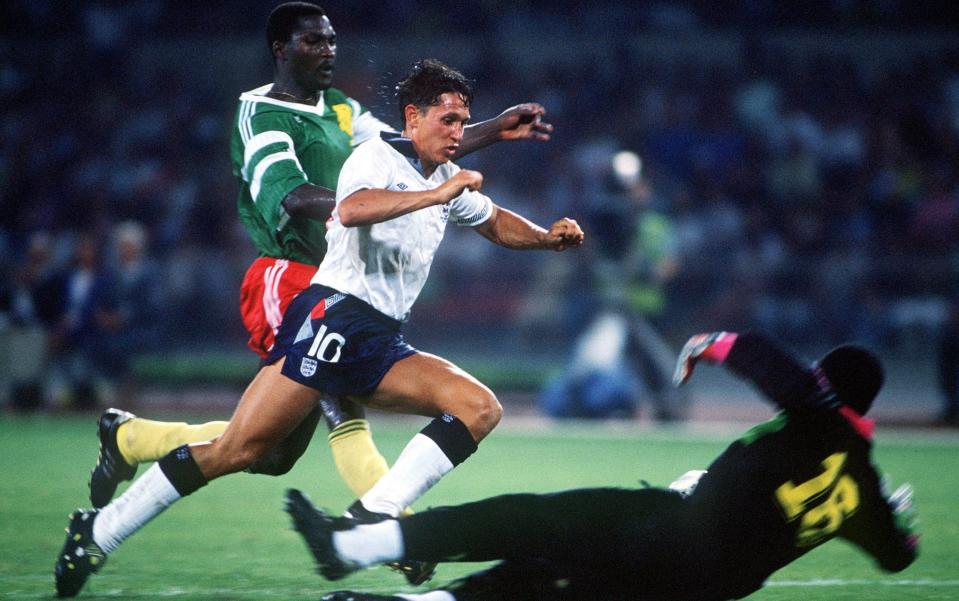Sports
Can England rebuild their team mid-tournament? They did it at Italia ’90

The crucial thing to remember about England at Italia ’90 and how Sir Bobby Robson and his players went from being cast as national embarrassment to heroes is that it was, throughout, on and off the pitch, an astonishing story of scandal, feuds, violence – and tactics.
There are some parallels, of course, to be drawn with the challenges facing Gareth Southgate. Chief among them: can you rebuild a team mid-tournament? Robson made his major tactical switch in the second group game against the Netherlands. He went to five at the back and introduced Mark Wright as a third centre-half – or sweeper as it was regarded then. Before he did so, Robson said he asked his players a question: “If we get into this plane, can you fly it?”
His senior players said they could, and so began one of the greatest stories in English football. Southgate and his players may look with interest on those seven games of 1990, because Robson never once picked the same team. As for what happened off-stage, it would amaze the young men of 2024. Their most voluble media critic this tournament, Gary Lineker, was part of a player boycott of the media that lasted for part of that febrile June, 34 years ago.
That was around the Hostess Isabella scandal, and allegations – never proved – in three tabloid newspapers of the day. Those were that three of the players had what was euphemistically described as “high jinks” with a local young woman in Sardinia, Isabella Ciaravolo, who had been working at the England hotel.
The tabloid reports were, Robson told The Daily Telegraph at the time, “a sad, dismal and pretty disgusting business”. The next day, the players boarded the coach at their base in Cagliari refusing to speak to the media. It should be noted that players with lucrative deals to write first-person newspaper columns did not boycott those. “It is the type of thing that is concocted to sell papers,” Robson said, “It is abusive and scandalous. I think this is a diabolical game to play.”
He was referring to the news reporters, known as “the rotters” by their despairing colleagues on the sport pages. Yet that was just the start of it. When England failed to beat the Republic of Ireland in the first game on June 11, a match so poor in quality that the rest of the world looked on in disbelief, the reaction was splenetic. The Sun, then Britain’s best-selling newspaper, led two days later with the headline “BRING THEM HOME”.


A whole 26 days later, after England finished fourth, following defeat by Italy in the third-place play-off on July 7, The Sun headline struck a rather different tone: “SALUTE OUR BRAVE LADS”.
In the interim, the injured Bryan Robson would personally pay to fly to Cagliari Olga Stringfellow, a 70-year-old faith healer from Hampshire, who said she could solve the England captain’s Achilles problem. Less than a week later, Robson flew home, his problem unsolved and his World Cup over.
Injuries threatened key players. Lineker did not train again after the game against the Netherlands, nursing a toe injury. The centre-half Des Walker played through the pain of an ankle injury. John Barnes would eventually come off in the quarter-final against Cameroon with a persistent groin complaint and would not feature again. Yet England kept adapting and new players emerged.
‘He needs a bodyguard’
Robson’s new tactical shape, and the injuries that plagued the team, meant change. Paul Parker at right wing-back, David Platt in midfield and, above all, the mercurial Paul Gascoigne, who presented his own problems. The Telegraph’s Michael Calvin complained in one dispatch that Gascoigne had ruined an interview he was conducting with Parker by throwing paper cups at the Queens Park Rangers player.
Robson had to order Gascoigne off the hotel tennis court where he was playing against American tourists in the blazing heat in Bologna before the quarter-final. “He is hyperactive,” the England manager complained. “He needs a bodyguard.”
As for that tactical switch, in the second game – it nullified the Dutch attack of Ruud Gullit and Marco van Basten, who had cut England to shreds at Euro ’88. But whose idea was it?
For his whole life, Sir Bobby Robson said that the notion his players had dictated to him was a “ludicrous concept”. In Robson’s 2005 autobiography with the celebrated sportswriter Paul Hayward, he was clear. “I was,” Robson said, “never dictated to by my players.”
Seventeen years later, Hayward wrote the definitive history of the England team and asked Bryan Robson for his view. The England captain of 1990 said that, along with Lineker and Chris Waddle, he had spoken to the manager. “We thought the sweeper system would suit the players and suit the team,” Bryan said.


Either way, the goalless draw with the Netherlands on June 16 was an improvement. Peter Beardsley was left out. Parker came in for Everton’s Gary Stevens. In the third group game against Egypt, Bobby Robson changed again. He left out Terry Butcher, switched back to 4-4-2 and replaced the increasingly immobile Bryan Robson with Steve McMahon. Wright scored the winner, England won the group and suddenly it looked better.
The Telegraph reported that the squad were feeling so much more upbeat that the players would sing the World in Motion hit they had collaborated on with the band New Order in the weeks before the tournament. Even though it had reached No 1 in the British charts – and as high as 21 in West Germany – the players still did not know the words. Instead, they would just chant the line “Express yourself” over and again on coach journeys to training.
‘There is no worry with England’
Bryan Robson departed for home, and Bobby Robson switched back to 5-4-1 for the round-of-16 game against Belgium. Unlike England, Belgium had not won their group, which would have meant a tie with Yugoslavia. That was on the mind of the team’s star, Enzo Scifo, when he held court with The Telegraph in the lobby of his team’s hotel. “Personally, I’m much happier with England,” Scifo said. “If Yugoslavia have one of their best days, it’s very difficult to get the ball off them. There is no such worry with England.”
He was right in many respects, but as penalties loomed, 24-year-old Platt, on as a substitute for the third time at the tournament, scored a famous winner. Robson had found another piece of his developing team. Platt would start the quarter-finals and semi-finals in place of McMahon.
The Telegraph football correspondent of the era, Colin Gibson, who had himself been a trenchant critic of the treatment of Bobby Robson by some of the British press, took stock ahead of the quarter-final. “England,” he said, “have shown a willingness to learn and adapt.”
In the meantime, Robson was presented by Gibson and his peers at other newspapers with his leaving present. After eight years in the job, the same as Southgate, Robson was due to take over at PSV Eindhoven just days after the World Cup final. He was given a 17th century map of Sardinia said to be worth £700. The football press pack also organised, via contacts at the RAF, for Robson to be flown by a Nato fighter jet around the Mediterranean.
One can only hope, if this is to be his last tournament, Southgate does not expect that the current press pack might be able to do the same. Robson called the flight “one of the most memorable experiences of my life”. There would be more to come. Concerns lingered about Gascoigne’s ability to last 90 minutes. He had lost a stone and a half, The Telegraph reported, since joining Tottenham Hotspur two years earlier. Gascoigne was also being paid £30,000 a year by a tabloid newspaper for what The Telegraph referred to witheringly as “exclusive banalities”.
‘We have been slaughtered’
Beating Cameroon would mean a first World Cup semi-final on foreign soil. There was talk of a revolution in the English game, now in the fifth year of a Uefa ban from European club competitions. Waddle, who started every game bar the third-place play-off, was less willing to see the upside. “We have been slaughtered,” he said. “What gets me annoyed is that it isn’t constructive … and we realise if we lose to Cameroon it will start again.”
Away from the games, the fear of English hooliganism, real or otherwise, continued. Around 250 English fans were forcibly deported by Italian police while the Belgium game was being played. After Cameroon were beaten there would be fighting between English and West German fans at the Porta Nuova railway station in Turin, a city that already knew the cost of fan disorder from the Heysel Stadium disaster.
Victory over Cameroon in Naples meant Robson was finally vindicated. No other manager since Sir Alf Ramsey had gone this far and he turned on his critics. “I don’t have to get involved in that situation,” he said. “All I will say is that some people have got away with murder.”


Wright needed stitches in his head. Lineker and Walker were still managing injuries. Barnes was out and Beardsley came back in for the semi-final against West Germany. Gascoigne and Platt were now the heart of the team. Franz Beckenbauer, a good friend of Robson and his semi-final opponent, said that he was pleased for his counterpart. “The English press,” observed the great Beckenbauer delicately, “is not always gentle to him.”
For the penultimate time, Robson would pick a new team. The semi-final was as far as England would go. After elimination on penalties there was violence in English towns and cities including Hull, Northampton, Derby and Torquay. This strange compulsion was no longer confined to match-going fans. In London, German cars were vandalised. The Telegraph reported that in Brighton, 300 German students were kept inside a nightclub by Sussex police for their own safety and then ferried home on special buses. A large mob of young people threw bottles at police in Cheshunt, Hertfordshire. No one could explain it.
In Italy, television coverage obsessed over Gascoigne. Torino made an inquiry to Spurs about Lineker’s availability. The England players’ commercial representative boasted of a £1.5 million deal with a “soft drinks manufacturer”. For the play-off against Italy, Robson left out the two players who had missed penalties in the semi-final shoot-out with West Germany, Waddle and Stuart Pearce.
Robson departed for PSV Eindhoven a national hero. The players were treated the same on their return to Luton airport. Peter Shilton and Butcher announced their international retirement. English football had changed, and so, too, the England team, over the course of a tournament.
Whose idea had it been to adapt the tactics?
Robson, Southgate will note, never wavered in his stance that he, and he alone, made the switch to five at the back. “I would,” Robson wrote years later, “stake my whole reputation on this version of events.”





